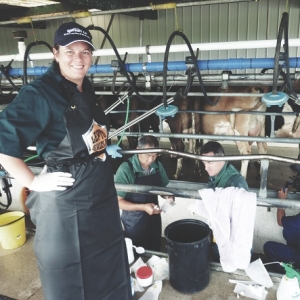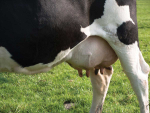DRYING-OFF COWS early as the drought’s grip tightens can result in unwelcome mastitis problems early next spring. But research has shown the possibility of dodging the early spring mastitis ‘bullet’, says Zoetis (formerly Pfizer Animal Health), the New Zealand distributor of Teatseal.
The company says work by Massey University associate professor in production animal health Dr Richard Laven shows combination dry cow therapy using effective antibiotics with Teatseal can cut mastitis incidence by 50% during the early post-calving period.
Typically New Zealand’s seasonal dry cow period lasts longer than in many countries, and this year many cows face a longer dry period than the average 85 days, because of the impact of the summer dry, Zoetis says. This often results in a dry period that stretches beyond the effective ability of even the longest-acting antibiotic dry cow treatments, leaving cows exposed to infection risk early in calving.
Laven’s 2006 trial was the first under New Zealand conditions to study how effective combination dry cow therapy was on cows over a longer period of time. Earlier work has shown the level of infection of cows over the average dry spell of 80 days increases by a third, from 19% infection rate to 26%. This is because even the longest-acting antibiotic therapy only lasts about 70 days at most, leaving the udder increasingly vulnerable to infection after that point as the antibiotic’s effect tapers off.
Laven studied 650 cows split into two mobs; one mob had antibiotic treatment only, the other had combination treatment with Teatseal. Both had an average dry period of 112 days, almost twice the effective period of the antibiotic used. “This was pretty typical for a season in New Zealand where grass growth has been poor,” Zoetis reports Laven as saying.
The cows treated with combination therapy recorded an infection rate of 10%, almost half that recorded in those treated with antibiotic alone. This supports earlier work by Dr Eric Hillerton, DairyNZ’s chief scientist, whose UK work showed a 50% reduction in udder infections when Teatseal was used in combination with antibiotic.
Laven’s results also support earlier studies that had shown Teatseal is persistent for at least 100 days in the teat canal, and still present when stripped out at the first milking. “Given the sort of season we are now having, the trial shows you can go into a longer dry period and Teatseal is still there,” says Laven.
Teatseal is an inert waxy bismuth-based product that, once inserted into the teat canal, acts as a plug. It prevents bacteria entering the canal, continuing protection particularly in the two weeks prior to calving as the canal begins to expand prior to lactation.


















